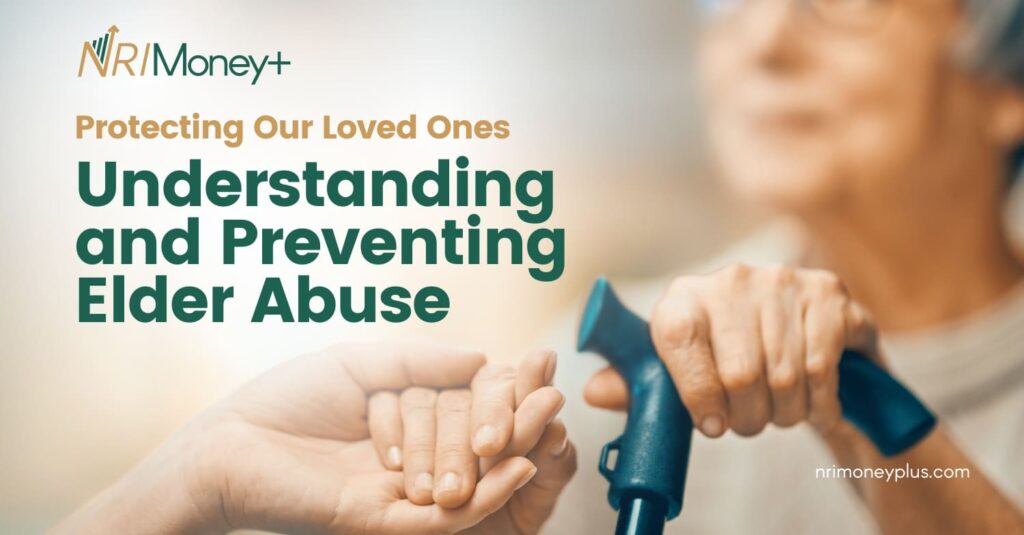June 15th marks World Elder Abuse Awareness Day, a global initiative aimed at raising awareness about the mistreatment of older adults. As NRIs living abroad, it’s crucial for us to understand the signs of elder abuse and take proactive steps to protect our ageing parents who may be living alone in our home countries. This article explores the various aspects of elder abuse, and its impact on individuals and families, and provides actionable advice to safeguard our loved ones’ financial and emotional well-being.
Understanding Elder Abuse:
Elder abuse encompasses physical, emotional, sexual, or financial mistreatment of older adults. It can occur in various settings, including their own homes, care facilities, or even online. Common forms of abuse include neglect, exploitation, verbal abuse, and even abandonment. By familiarizing ourselves with the signs and types of elder abuse, we can recognize potential dangers and intervene effectively.
Factors Contributing to Elder Abuse:
Several factors contribute to the vulnerability of older adults to abuse. Social isolation, cognitive decline, dependency, and lack of awareness about their rights and available support services can make them targets for unscrupulous individuals. Additionally, financial dependence and the transfer of assets to family members may create opportunities for financial exploitation.
Recognizing the Signs:
Elder abuse often goes unnoticed or unreported due to various reasons such as fear, shame, or the victims’ inability to communicate effectively. It is crucial to stay vigilant and recognize potential signs of abuse, which can include unexplained injuries, sudden changes in behaviour, emotional withdrawal, strained relationships with caregivers, and unusual financial transactions.
Preventive Measures:
a) Open Communication:
Maintain regular contact with your parents, establishing open lines of communication. Encourage them to share any concerns or incidents that may raise red flags.
b) Educate Your Parents:
Inform your parents about the various forms of elder abuse and teach them how to recognize and prevent it. Empower them with knowledge about their rights and available support systems.
c) Regular Visits and Checks:
Whenever possible, schedule regular visits or ask trusted friends and neighbours to check on your parents. This helps create a supportive network and reduces the risk of isolation and neglect.
d) Financial Protection:
Advise your parents to be cautious with their finances, such as not sharing personal information with strangers, avoiding joint accounts without proper legal documentation, and appointing a trusted individual to oversee their financial affairs if needed.
e) Caregiver Screening:
If your parents require assistance from caregivers, conduct thorough background checks and ensure they are hired through reputable agencies. Regularly assess their performance and interact with them to monitor the quality of care provided.
f) Legal Measures:
Consider creating a power of attorney or guardianship arrangement to protect your parents’ financial and legal interests. Consult an attorney with expertise in elder law for guidance.
Seeking Help and Support:
If you suspect elder abuse, take immediate action. Report your concerns to the appropriate authorities in your parent’s home country, such as adult protective services or helplines. In some cases, professional counselling or support groups may also be beneficial for both the victims and their families. Below are helplines in India that can help you in such matter.
- Elderline | Elder Line | 14567 | NHSC | National Helpline for Senior Citizens – National Helpline for Senior Citizens | NHSC | Elder LIne | Senior Citizens Helpline (dosje.gov.in)
- Dignity Foundation Helpline | Elder Abuse and Neglect in India | Indian Children Abusing Parents | Elder Abuse Prevention | (programsforelderly.com)
- Help For The Elderly, Senior Citizens Helpline, Elderly Health Care Services – HelpAge India
Conclusion:
As NRIs, it is our responsibility to protect and support our ageing parents who may be vulnerable to elder abuse. By understanding the signs, implementing preventive measures, and fostering open communication, we can create a safer environment for our loved ones. Let us stand united on World Elder Abuse Awareness Day and make a commitment to ensure the well-being and dignity of older adults in our communities.
Remember, spreading awareness is the first step towards combating elder abuse. Together, we can make a difference and provide a secure future for our ageing parents.

Donald G. is the Principal Consultant at NRI Money+. He specialises in creating personalised financial plans for NRIs (Non-Resident Indians) and HNI (High Net-worth Individuals).

